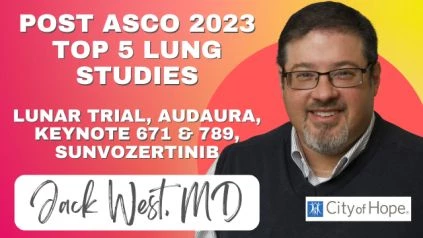Dr. Jack West, MD, an associate professor in medical oncology focused on thoracic oncology at the City of Hope Comprehensive Cancer Center in Los Angeles, addresses the highlights of ASCO 2023 lung cancer. He discussed his top five abstracts in the field.
-
The first abstract was the ADAURA trial, which showed improved overall survival with adjuvant osimertinib in EGF mutation-positive resectable disease.
-
The second abstract was Keynote 671, which explored perioperative chemo with pembrolizumab in lung cancer patients.
-
Keynote 789, the third abstract, was a trial of chemo with pembrolizumab for patients with acquired resistance to EGF mutation-positive disease.
-
The fourth abstract focused on an inhibitor of EGF mutation called suntinib, specifically targeting Exon 20 insertion mutations.
-
The last abstract was the Lunar trial, which investigated tumor treating fields applied to the chest alongside second-line systemic therapy.
Dr. West highlighted the key findings from the ADAURA trial, emphasizing the significant benefit in overall survival, particularly in stage 2 to 3A disease. He acknowledged that the study design did not directly compare proactive versus reactive therapy, leading to differences in access and timing of treatment. However, he considered the results practice affirming and urged careful consideration in future trial designs.
Regarding Keynote 671, Dr. West pointed out the encouraging event-free survival and the potential for improved overall survival. He noted the need for individualized discussions with patients regarding the postoperative component of pembrolizumab, as its incremental benefit is not yet clear.
In Keynote 789, Dr. West discussed the modest benefits of pembrolizumab in patients with acquired resistance to EGF TKI therapy. He highlighted the importance of ongoing osimertinib treatment, especially for patients with brain metastases, and cautioned against using immunotherapy without clear evidence of added benefit.
Lastly, Dr. West mentioned the study on suntinib as an inhibitor of EGF Exon 20 insertion mutations. He acknowledged the potential benefit of combining immunotherapy and anti-angiogenic treatments for patients with EGF mutation-positive disease.
Overall, Dr. West provided a comprehensive overview of the key abstracts and emphasized the need for further research and careful consideration in clinical practice.

